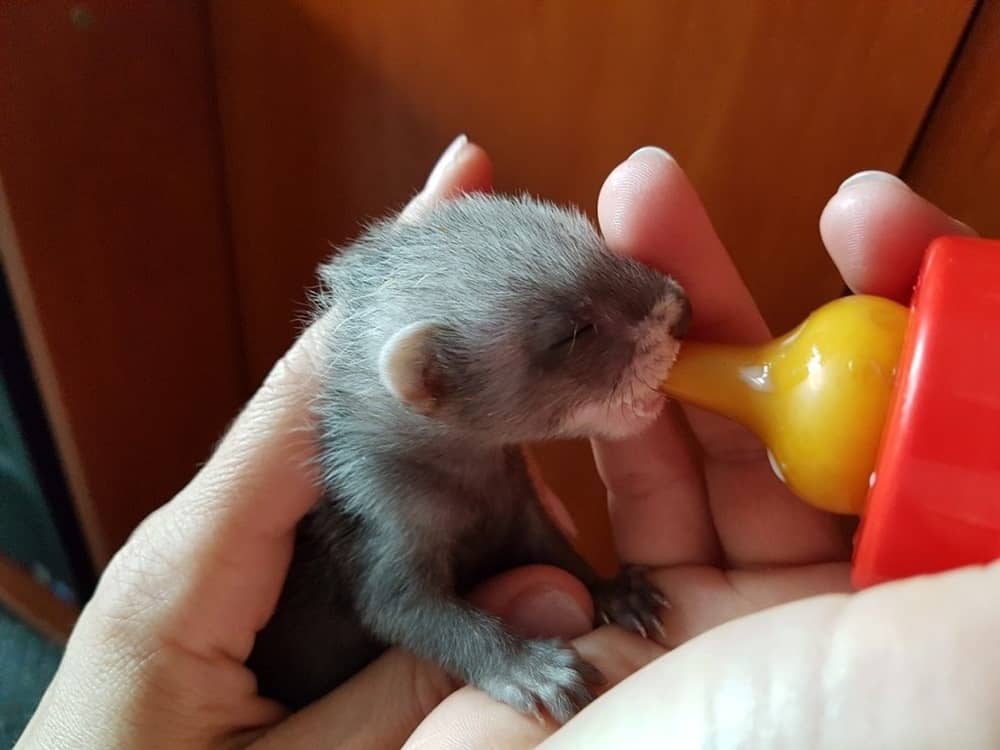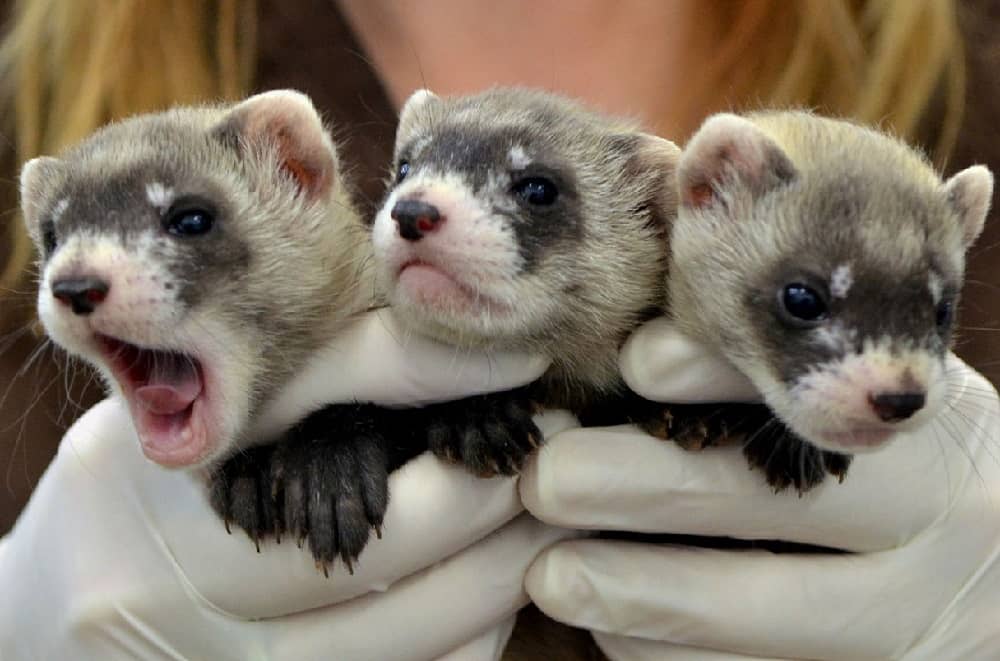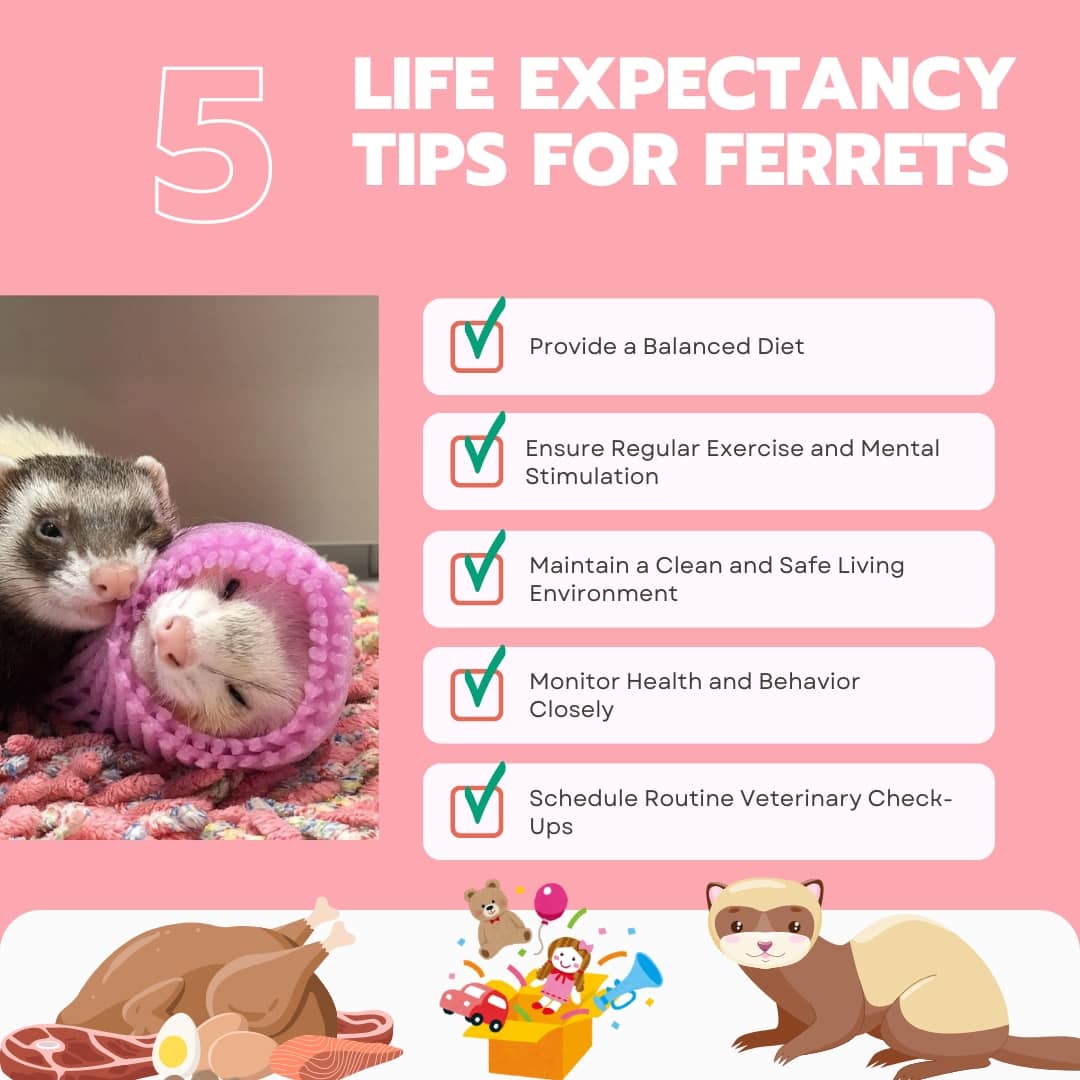The life expectancy of ferrets has many parameters that can be well taken care of to increase it. A ferret’s curiosity and sense of fun make them quite endearing pets. Ferret’s lifespan and the different stages they go through in their development from birth to adulthood are important knowledge in rendering the best possible care to them.
The article will cover topics on the different phases a ferret goes through in his life and how it might affect longevity, guiding a person into keeping such lovely creatures happy and healthy.

The average life expectancy of domestic ferrets runs from 6 to 10 years. Again, this varies from one ferret to another according to the interaction and interplay of variables such as genetics, dietary intake, living conditions, and quality of healthcare. While some may make it past the 10-year mark, others have a lifespan much shorter than that either due to some pre-existing health condition or poor care.
Factors That Affect Ferret’s Life Expectancy
Ferrets that enjoy a combination of good genetics, a healthy lifestyle, and proper care typically live longer. Here are a few key aspects:
Genetics:
Just as in any other animal, some things in ferrets are passed on from the parents. If raised properly and from a non-diseased heritage, ferrets do live longer. Be sure to obtain your ferret from a responsible breeder for whom health is paramount over the number of ferrets.
Diet:
Diet is one of the major factors in determining how long a ferret can live. Ferrets are obligate carnivores, so they need a high content of protein and a low intake of carbohydrates in their diets. A high-quality diet comprising good-quality ferret food or a raw diet mimicking the contents of natural prey is likely to sustain a longer and healthier life.

Environment:
Provide a stimulating environment with enough space to play, explore, and exercise. Ferrets are very active creatures that work out a lot to stay fit and healthy. Cleanliness, safety, and enrichment of the environment would prevent most diseases.
Healthcare:
The visits to the veterinarian need to be frequent, vaccinations timely, and diseases treated as early as possible. Ferrets are prone to several diseases, such as adrenal disease, insulinoma, and lymphoma. Their diagnosis and treatment make all the difference at what age they are diagnosed and treated.
Ferret’s Life Stages
Knowing the life stages can be very instrumental in giving age-based care to your ferret. The following describes a ferret’s life from birth to adulthood:
Infancy (0-8 Weeks)
The babies of ferrets, otherwise called ferret kits, are born blind and deaf. Their weight is about 6 to 14 grams. During the first three weeks of their lives, they solely depend on their mother’s milk. By 4 to 5 weeks, their eyes and ears would have opened, and they would start climbing out of the nesting box to explore their world. By the time they are 8 weeks old, they would already have weaned and be ready to find new homes.

Juvenile (8 Weeks – 1 Year)
The juvenile stage of a ferret is from 8 weeks to 1 year. At this age, they grow fast and are extremely energetic and playful. It’s a good time to let them get familiar with new environments and introduce them to new toys and socialization. This phase requires good nutrition and regular visits to the vet in order to guide them through proper growth and development.
Adulthood (1-4 Years)
Ferrets become adults around 1 year of age. They are still very active at this age although they may start to mature a little. A good diet and a clean, well-stimulating environment are both crucial in maintaining fitness and activity. Regular check-ups with the vet will facilitate early detection of disease.

Middle Age (4 – 6 Years)
Although ferrets are technically classed as middle-aged when their activity levels fall slightly and the first signs of aging begin to show, this is the time when owners need to be more vigilant regarding their health. Monitor your ferrets for any signs of illness and ailments common to ferrets. A diet of more easily digestible food allied with plenty of exercise can help manage the process of aging.
Senior Age (6+ Years)
Ferrets 6 years and above are considered seniors. With proper care and regular veterinary checkups, they will most likely have reduced energy levels and probably some age-related health issues. The regularity of veterinary care will monitor, regulate, and assure a better quality of life for the pet. Comfortable living conditions and mild exercises, together with an age-suited diet, shall also grace the life of an older ferret.
How to Improve a Ferret’s Life Expectancy?
The life expectancy of ferrets depends on various factors and by taking care of these, one can improve the lifespan of their fur balls. To enhance your ferret’s lifespan, consider the following tips:
Provide Proper Nutrition to Your Ferret
Give good quality, meat-based food. Nevertheless, foods that contain large amounts of carbohydrates and sugar are not easily digested in ferrets. Indeed, some vets may even recommend raw or freeze-dried diets prepared specifically for ferrets.
Give them Opportunities to Exercise and Enrichment
Ferrets have to be provided with ample space and exercise. A large playing area that has been ferret-proofed, with tunnels, toys, and climbing, can help keep your ferret stimulated and physically fit. The regular play outside the cage is very essential.

Checking Health Parameters Regularly
Regular visits to the veterinarian can allow health issues to be spotted early on. This can further help you to provide proper care by making dietary changes.
Parasitic Prevention:
Dental care and parasite prevention are also important. Be alert for the first signs of illness, weight loss, and behavioral changes, and seek your vet’s advice promptly.
Vaccination:
You should vaccinate your ferret for rabies and distemper diseases to enhance their overall health and hence life expectancy.
Spaying and Neutering:
Spaying and neutering ferrets are common veterinary procedures. It offers significant health benefits, contributing to a longer and healthier life for your pet. Spaying female ferrets (jills) prevents ovarian, uterine, and mammary cancers. These cancers are relatively common in unspayed ferrets and can significantly shorten their lifespan. Neutering male ferrets (hobs) reduces the risk of testicular cancer.
The removal of reproductive organs eliminates the risk of infections such as pyometra in females, a severe uterine infection.
Socialization:
Ferrets are creatures that thrive on interaction. This can be with their human family or other ferrets; ensure they get enough socialization to keep them mentally and emotionally stable. Consider adopting in pairs so they will have each other’s company.

Environment:
The place should be clean, safe, and enriched. Ferrets are curious creatures; they are going to get into a lot of trouble if their environment is not ferret-proofed. Cleaning regularly and giving them a place to hide, some toys, and activities enhance the place so much more.

Supervision:
You should always monitor your ferret’s activity when it is allowed to play outside the cage. Apply a generous amount of ferret-safe flea and tick repellent to your pet before letting him go outside. Be sure to spray his back and legs, as well as his chest, stomach, and under his arm.
Do Ferrets Die Frequently?
Ferrets are comparatively resilient animals. Unfortunately, poor breeding practices have significantly reduced the typical ferret’s lifespan. In the 1980s, as ferrets became more and more popular, domestic breeders proliferated.
While some of them bred ferrets mainly for profit, others bred them to improve the species. Sometimes, attractive characteristics were valued more highly than healthy ones. Consequently, this has shortened the ferret’s life.

These days, a lot of ferrets have short lifespans. Due to their suppliers’ emphasis on profit, the majority of these ferrets come from pet retailers. Similar to puppy mills, some ferret breeders want to produce as many ferrets as they can at the lowest feasible cost.
It is advisable to adopt from a reputable breeder if you’re looking for a long-living ferret. You should be able to discern how much breeders that only sell directly care about the final destination of their ferrets—that is, how much they value them as pets.
Quick Tips to Improve Life Expectancy of Ferrets

Frequently Asked Questions
Question 1: What is the normal life expectancy of a ferret?
Answer: Ferrets live for 6 to 10 years, though some have been known to live longer if properly cared for.
Question 2: What things might affect how long a ferret lives?
Answer: Genetics, nutrition, living conditions, access to healthcare. Ferrets that are hand-raised, fed high protein diets, maintained in safe and interesting environments, and receive regular veterinary care generally live longer.
Question 3: What is the best diet for a ferret?
Answer: Ferrets are strict carnivores; as such, they need high-protein, low-carb diets. Only quality ferret food or raw diets are recommended.
Question 4: How often should my ferret see a vet to ensure a long life?
Answer: At a minimum, a ferret should see the vet at least once a year; usually more frequently with advancing age or symptoms of disease.
Question 5: What health issues are common in ferrets?
Answer: The major health issues commonly considered to occur in ferrets are adrenal diseases, insulinoma, lymphoma, and dental problems. Such diseases can be checked during regular vet check-ups and treated accordingly.
Question 6: What’s the way to keep my ferret active and healthy?
Answer: Allow a ferret-proof area for playing freely with a lot of toys, tunnels, or climbing structures. The ferret needs time to play freely outside the cage and socializing is also a part of its needs.
Question 7: Does spaying or neutering affect a ferret’s lifespan?
Answer: Spaying or neutering can prevent certain health issues and may contribute to a longer, healthier life.
Conclusion
A ferret’s life is something that frolics, excites, and displays a lot of affection. From tiny times as a kit to golden years as a senior ferret, every stage of life brings with it its very special set of joys and problems of its own. Knowing what they need at the different stages of their lives and giving them proper treatment during that stage will ensure long, healthy, full lives for ferrets.
The ferret is a tender, devoted, and learned pet. It’s not just food and a roof over their head; it’s much about enriching their lives with activity, socialization, and proper health care. Curious and loving pets can fill any home with joy and laughter. They merely survive on attention and activity, thus proving to be a great companion to those willing and capable of investing time and energy into them.

A healthy ferret is full of entertainment and affection. From playful frolics to limitless energies, curiosity in nature makes them pretty exciting to be around and watch. Every ferret grows its own personality; hence, getting familiar with your ferret’s quirks and preferences is part of the fun of owning a ferret.
The key to keeping a ferret healthy beyond its average lifespan is being very aware of its particular needs and providing it with a nurturing environment. You can keep yourself updated with news, shows, breeder’s information, and much more by becoming a member of the American Ferrat Association. Continuous veterinary care, proper diet and exercise, and socialization are the three major keys to ferret keeping. If one is aware and alert, there can be many loving years with their dear pets.


